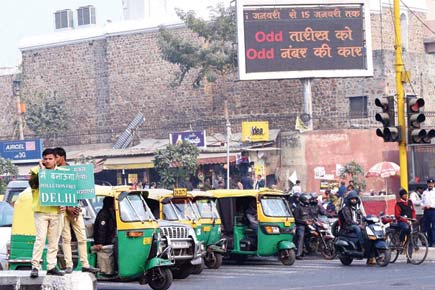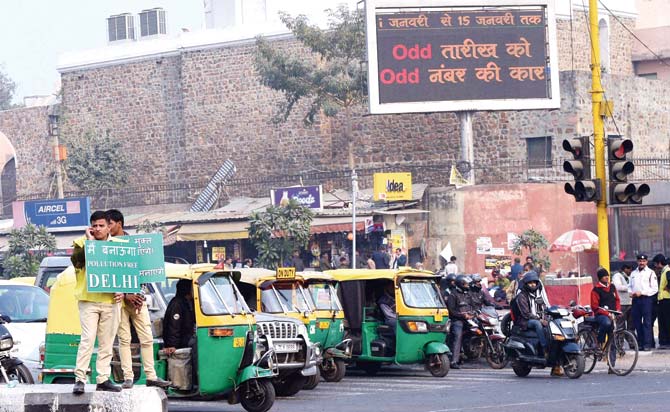As New Delhi’s odd/even traffic trial comes to an end, what other options do we have to ensure cleaner air for breathing?

 Reports of the success of New Delhi’s odd/even number-plate scheme are not easy to assess here in the UK, where I am currently on holiday. It seems that people like or dislike this idea to reduce traffic congestion and therefore pollution on the national capital’s roads depending on their politics. As is so often visible in human history, the actual worth of the idea can be made insignificant based on the image of the person who came up with the idea. Mention Arvind Kejriwal, and the whole of India has an opinion to share on the man, myself included.
Reports of the success of New Delhi’s odd/even number-plate scheme are not easy to assess here in the UK, where I am currently on holiday. It seems that people like or dislike this idea to reduce traffic congestion and therefore pollution on the national capital’s roads depending on their politics. As is so often visible in human history, the actual worth of the idea can be made insignificant based on the image of the person who came up with the idea. Mention Arvind Kejriwal, and the whole of India has an opinion to share on the man, myself included.

The odd/even trial that began on January 1 will end on Friday, confirmed Delhi CM Arvind Kejriwal. Pic/PTI
ADVERTISEMENT
However, in all the arguments against the scheme which was put forward by Kejriwal’s government last year, where cars with even number-plates are allowed on some days and odd number-plates on other days, the fact that the capital has been reeling under a pollution crisis of frightening magnitude has been easily forgotten. Apparently, whether you can breathe is not as important as whether you can drive home after a dinner party. On social media, photographs of the Diwali rush on the Delhi Metro were put out to prove that the odd/even scheme had caused unbearable pressure on other transport systems.
The planet though is not bothered with these little human problems. The more we abuse it, the more difficult it will be for us to live in it. Yes, we have perhaps gone too far down the urbanisation route to turn back and we have found many ways to fulfil ourselves which are aeons away from hunting and gathering or even something as recent as farming. But as carbon emission figures tell us year after year, the Universe is not interested in our progress or our need to go on long drives or even just simply, commute to work.
This means we’re on our own for now. Glaciers may scrub through the earth every several thousand years but are we sure we can wait till then? Alan Weisman in his book The World Without Us refers to our “Faustian affair with carbon fuel”. Here in London, there are real fears about pollution from diesel, which is being presented dramatically as worse than ‘Black Death’ — which in fact it is, perhaps far worse than the plague. In the first days of January 2016, London has already broken European Union regulations for annual nitrogen dioxide levels.
The naysayers have their own explanations here. For instance, pollution from other sources is also dangerous — construction dust, burning crops, industrial emissions. But if you have to start somewhere, it may as well be with vehicular traffic. The other whine is that public transport is the answer. And yes, that is undoubtedly true (We shall ignore for now London’s pollution figures in spite of its superb and well-integrated public transport system.) But there is also a need to be practical when your pollution levels are the second worst in the world.
How long do large infrastructure projects take to complete in India? The first leg of the Mumbai Metro took just under a decade and it covers just a tiny proportion of the city’s needs. The Calcutta Metro took decades. The Delhi Metro is very good but is still far from complete. The problem now is so large that small incremental changes are the only ways to deal with it now, until the larger solutions can become effective.
The focus also needs to be on smaller cities in towns. Dehradun, where I now live, has an abysmal public transport system — it is non-existent for all practical purposes. However apartment blocks and townships are being built seemingly without any thought for the resultant pressures on existing utilities. We continue to have this skewed idea of what constitutes growth: a big, glass-fronted shopping mall.
Back in Delhi, from what I can fathom, some people say the idea has worked and some say it hasn’t. Some say traffic is down but not pollution or the other way around. The Delhi government has announced that the scheme is temporary, which is the only way it can be successful, judging by world experience.
I suppose the other options could have been to stop all construction and stop all industry. Yeah, I’m laughing so much I can’t write any more.
Ranjona Banerji is a senior journalist. You can follow her on Twitter @ranjona
 Subscribe today by clicking the link and stay updated with the latest news!" Click here!
Subscribe today by clicking the link and stay updated with the latest news!" Click here!







